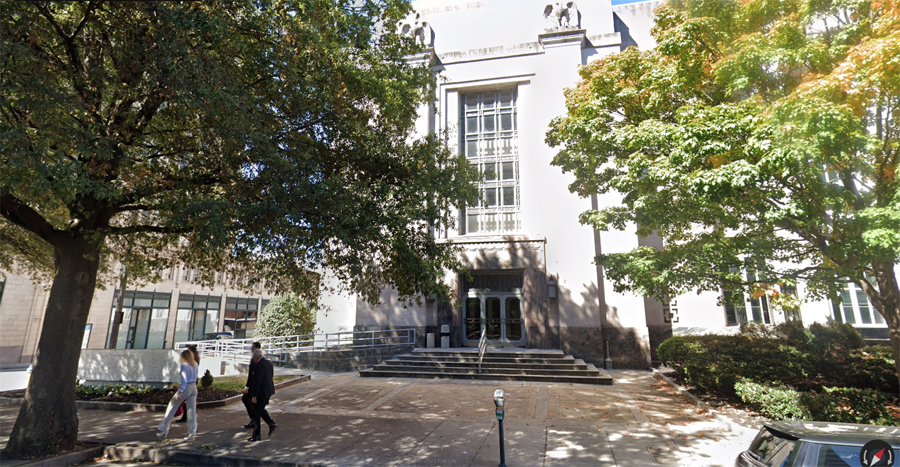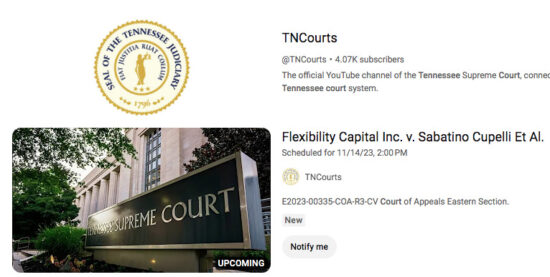
My counterattack against loan shark Flexibility Capital is Nov. 14, 2023, in this courthouse in Knoxville, Tenn. (Photo Google)

Flexibility Capital, in a pitch for borrowers, avoids banking and lending regulation by pretending it is buying future receivables from shopkeeps, business owners and individuals. (Photo Flexibilty Capital)
CHATTANOOGA, Tenn., Saturday, Nov. 11, 2023 — On Tuesday I make oral arguments in the Flexibility Capital case seeking to overthrow a loan shark’s operations statewide.
By David Tulis / NoogaRadio Network
Lawyers, judges and petitioners will gather in the historic U.S. post office and courthouse in Knoxville at 505 Main St. Flexibility Capital Inc. v. Sabatino Cupelli et al is second on a docket that starts at 1:30 p.m., with each side getting 15 minutes to argue.
Flexbility is a so-called business funder or lender, extending loans across the U.S. at interest rates past 200 percent per annum. But the loans are disguised as advanced purchases of future receivables. They come with personal guaranty provisions that make the owners of a business personally liable for repayment if a default occurs — such as that prompted in Tennessee by the CV-19 fraud and emergency of Gov. Bill Lee.
In the case I am defending I show that the agreement among Flexiblity and Sab Cupelli and me would have been concluded amicably if not for a shutdown of the entire economy in the state, an interference in the right of contract. The suit for nonpayment puts scrutiny on the contract itself — 14 pages — and the fraudulent and deceptive nature of its provisions.
If an advance purchase of future receivables is not actually a risk-sharing extension of money buying future cash flow from a merchant, but a loan absolutely required to be repaid, with an interest rate at 208.05 percent, it is illegal in Tennessee with the state’s 10 percent cap on loan interest, and in New York, with its 25 percent cap under a usury ban.
I am asking for a finding by judges D. Michael Swiney, John Wesley McClarty, Thomas R. Frierson II and Kristi M. Davis that the contract is for a loan, and that the loan is unconscionable, unenforceable. Indeed a criminal act, since I had apprised Flexiblity and attorney Mary Cheadle of Nashville that it is an illegal usury loan and they are fully aware it is illegal.
Journalist in appeal turns, rends N.Y. loan shark: Is it real cash advance, or criminal usury?
The case is one of first impression in Tennessee. The ruling will provide guidance for future litigation for breach of the usury statute T.C.A. § 47-14-112, and if it is strong and clear enough may force such businesses to halt operations statewide.
“To constitute usury there must be a requirement that the money loaned be repayable absolutely. If it is payable only upon some contingency, the transaction is not usurious” Lake Hiwassee Dev. Co. v. Pioneer Bank, 535 S.W.2d 323 (Tenn. 1976). Usury imports the existence of four elements: (1) A loan or forbearance, either express or implied; (2) an understanding between the parties that the principal shall be repayable absolutely; (3) the exaction of a greater profit than allowed by law; and (4) an intention to violate the law. Jenkins v. Dugger, 96 F.2d 727, 729 (6th Cir. 1938).
Link to David arguments on YouTube
Flexibility has had strong support by the judicial branch in government in Hamilton County. Circuit court judge Kyle Hedrick refuses to dismiss the case for lack of subject matter jurisdiction, saying, “If I don’t have subject matter jurisdiction the court of appeals will let me know lickety-split.” The refusal to dismiss is a breach of the judicial ethical canon and unjust.
I argue that Judge Hedrick, in upholding Flexibility’s fraudulent use of legal process is a fraud on the court and that Judge Hedrick is “conjoined at the hip” with wrongdoers to abuse my radio station partner and me.

The Tennessee appeals courts are in the old U.S. post office and courts building in Knoxville. (Photo Google Earth)


